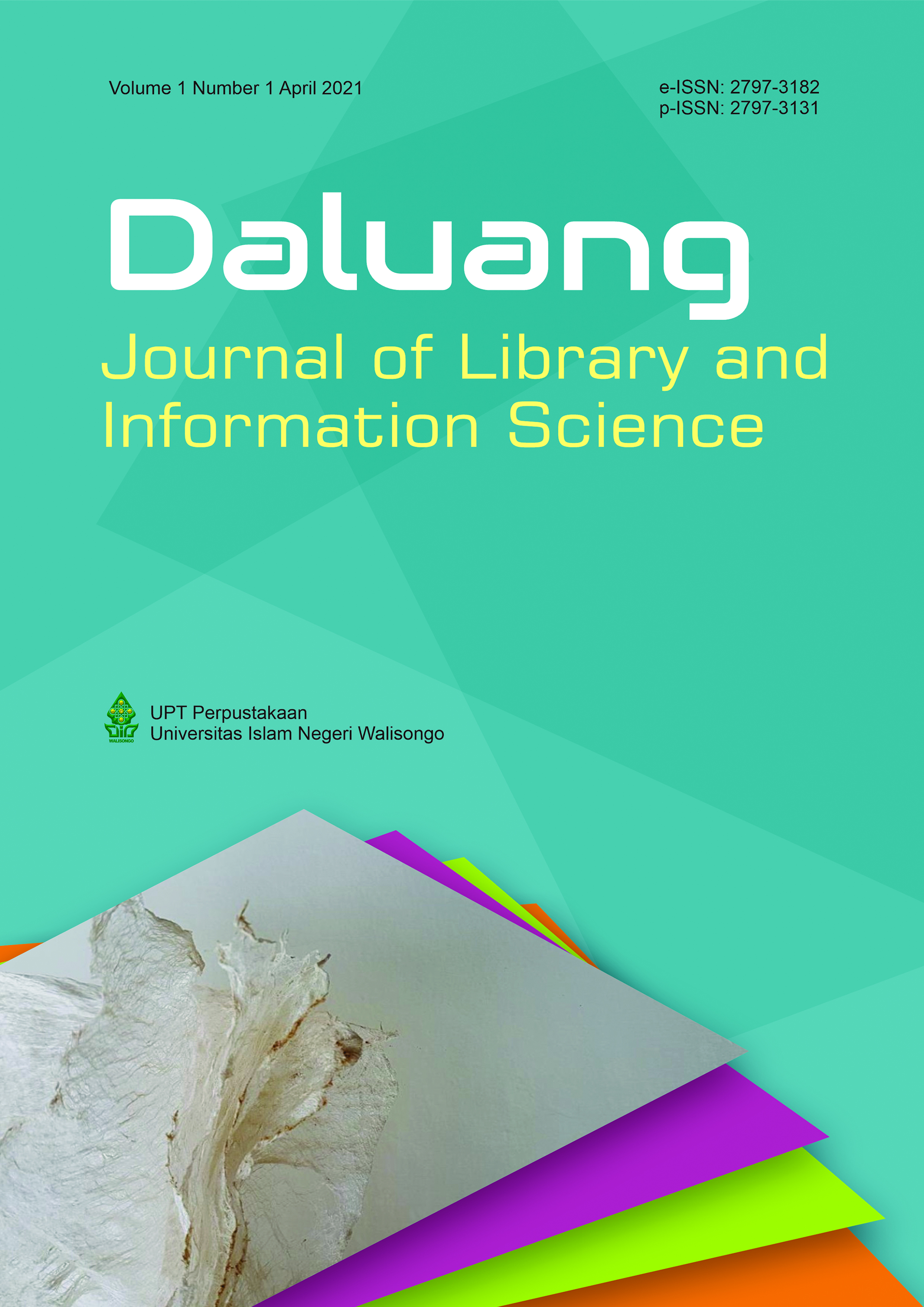Inovasi Perpustakaan dalam Mendukung Program E-Learning di masa Pandemi Covid-19
Main Article Content
Abstract
Background: The Covid-19 pandemic has had various impacts on society. The impact on the world of education is one of them. The community is required to follow changes in learning patterns from face-to-face to long-distance which is often called e-learning. For this reason, various parties are needed to support this learning process, one of which is a library with the aim of supporting the learning process of the community in the midst of pandemic.
Methodology: This research uses descriptive research method. For data collection and analysis methods using literature studies from various references.
Results and Discussion: Raising awareness of the importance of education during a pandemic to the public, distance learning is a need that must be met with synergy of education providers, communities, governments and libraries. Innovation in circulation services, database services and e-resources, managing online library events, compiling credible information sources and coordinating among librarians are expected to support e-learning programs in Indonesia.
Conclusion: This study shows that e-learning is very much needed by society in current and future conditions. The education system can be implemented practically, efficiently and facilitates community learning. Library innovation to support e-learning is also very much needed to support the community learning process in the midst of a pandemic.
Downloads
Article Details
This work is licensed under a Creative Commons Attribution-NonCommercial-NoDerivatives 4.0 International License.
Articles published in Daluang Journal of Library and information Science are available under Creative Commons Attribution Non-Commercial No Derivatives Licence (CC BY-NC-ND 4.0). Authors retain copyright in their work and grant Daluang Journal of Library and information Science right of first publication under CC BY-NC-ND 4.0. Users have the right to read, download, copy, distribute, print, search, or link to the full texts of articles in this journal, and to use them for any other lawful purpose.
Articles published in Daluang Journal of Library and information Science can be copied, communicated and shared in their published form for non-commercial purposes provided full attribution is given to the author and the journal. Authors are able to enter into separate, additional contractual arrangements for the non-exclusive distribution of the journal's published version of the work (e.g., post it to an institutional repository or publish it in a book), with an acknowledgment of its initial publication in this journal.
This copyright notice applies to articles published in Daluang Journal of Library and information Science volumes 1 onwards.
References
Bahrudin, M. (2020). Bagaimana Pustakawan Bekerja di Tengah Pandemi Covid-19? Pustakawan Blogger Indonesia, Corona Virus Diseases. https://www.pustakawan.web.id/2020/03/pustakawan-di-tengah-pandemik-covid19.html
Chang, L., Yan, Y., & Wang, L. (2020). Coronavirus Disease 2019: Coronaviruses and Blood Safety. Transfusion Medicine Reviews, September 2012, 2–7. https://doi.org/10.1016/j.tmrv.2020.02.003
Decaro, N., & Lorusso, A. (2020). Novel human coronavirus (SARS-CoV-2): A lesson from animal coronaviruses. Veterinary Microbiology, 244(March), 108693. https://doi.org/10.1016/j.vetmic.2020.108693
Karwati, E. (2014). Pengaruh Pembelajaran Elektronik (E-Learning) terhadap Mutu Belajar Mahasiswa. Jurnal Penelitian Komunikasi, 17(1), 41–54. https://doi.org/10.20422/jpk.v17i1.5
Kaul, D. (2020). An overview of coronaviruses including the SARS-2 coronavirus - Molecular biology, epidemiology and clinical implications. Current Medicine Research and Practice, xxxx, 1–11. https://doi.org/10.1016/j.cmrp.2020.04.001
Muntinah, D. (2015). Penerapan Metode E-learning dan Layanan Sirkulasi Sebagai Model Pembangunan Digital Library. Libraria, 3(1), 138–147.
Mustar, M. (2020). Layanan Perpustakaan di Tengah Pandemi Covid-19. In Buku KMP 9, Pustakawan, Perpustakaan, dan Kebencanaan (Vol. 9, pp. 193–213).
Mustar, M., & Nashihuddin, W. (2019). Dokter Pustaka: Layanan Informasi Online Bidang Kesehatan Alumni Fakultas Kedokteran, Kesehatan Masyarakat dan Keperawatan Universitas Gadjah Mada Yogyakarta. Lentera Pustaka: Jurnal Kajian Ilmu Perpustakaan, Informasi Dan Kearsipan, 5(2), 97. https://doi.org/10.14710/lenpust.v5i2.25944
Prawiradirga, D. S. et. al. (2013). Mozaik Pendidikan Teknologi E-learning (1st ed.). Pranamedia Group.
Putra, A. W. et. al. (2021). Inovasi Layanan Drive-thru Perpustakaan untuk Meningkatkan Budaya Literasi (Studi di Dinas Perpustakaan dan Kearsipan Provinsi Jawa Timur). Publika, 2(2), 25–38.
Rachmaningsih, D. M. (2020). Perespektif Milenial: Pendidikan Jaraj Jauh (1st ed., Vol. 1). Penerbit Universitas Terbuka.
Radha, R., Mahalakshmi, K., Kumar, V. S., & Saravanakumar, A. R. (2020). E-Learning during Lockdown of Covid-19 Pandemic: A Global Perspective. International Journal of Control and Automation, 13(4), 1088–1099.
Republik-Indonesia. (2003). Undang-undang Republik Indonesia Nomor 20 Tahun 2003 Tentang Sistem Pendidikan Nasional. 0932(1), 147–173.
Sari, M., & Asmendri. (2020). Penelitian Kepustakaan (Library Research) dalam Penelitian Pendidikan IPA. NATURAL SCIENCE: Jurnal Penelitian Bidang IPA Dan Pendidikan IPA, 6(1), 41–53. https://ejournal.uinib.ac.id/jurnal/index.php/naturalscience/article/view/1555/1159
Suharti. (2019). Perpustakaan Digital Pendukung E-learning di Era Disrupsi. Buletin Perpustakaan Universitas Islam Indonesia, 2(1), 19–29.
Sungadi. (2018). Peran Perpustakaan Dalam Pembelajaran Online. Buletin Perpustakaan Universitas Islam Indonesia, 1(2), 75–95.
Triluqman, H., & Sukirman. (2009). Pengembangan Sistem Pembelajaran Online Berbasis Moodle Di Jurusan Kurikulum Dan Teknologi Pendidikan Universitas Negeri Semarang. Lembaran Ilmu Kependidikan, 38(1), 27–34.
Undang-undang Republik Indonesia No 43. (2007). Undang-Undang Republik Indonesia Tentang Perpustakaan.
Wahyuni, D. et. al. (2019). Sistem Informasi E-Learning AMIK Imelda Untuk Meningkatkan Mutu Pembelajaran. JATILIMA, 01(2).
Wulandari, N., & Nugroho, E. (2017). E-Learning: Implikasinya Terhadap Pelayanan Perpustakaan Perhuruan Tinggi dan Peran Pustakawan. Berkala Ilmu Perpustakaan Dan Informasi. https://doi.org/DOI: http://10.22146/bip.26199



